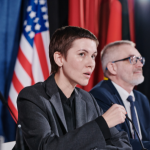The arrival of Ukrainian President Volodymyr Zelensky in Washington marked a decisive moment for ongoing international negotiations. Accompanied by several European leaders, he participated in a high-level meeting with Donald Trump to discuss security guarantees for the region. The timing of this gathering drew global attention, taking place only days after Trump and Russian President Vladimir Putin met in Alaska, a conversation that ended without a framework for ceasefire or stability.
The atmosphere in Washington carried a sense of urgency, as the conflict continues to shape not only Eastern Europe but also the broader balance of global power. European leaders joined Zelensky with the objective of ensuring that the interests of their countries remain protected once hostilities come to an end. Analysts have stressed that these diplomatic efforts are less about temporary solutions and more about constructing a durable system of alliances that can withstand shifting political landscapes in the years to come.
One of the central points of discussion centered on the future of the European security bloc and the commitments that the United States may be willing to formalize. Officials highlighted the need for structured guarantees that would prevent renewed aggression and preserve sovereignty across vulnerable regions. By seeking to align strategies with Washington, European partners demonstrated their reliance on transatlantic cooperation as a stabilizing force during uncertain times.
The meeting also served as an opportunity to evaluate the political implications of Trump’s recent exchange with Putin. While the Alaska summit did not result in a breakthrough, it underscored the fragile nature of communication between the two nuclear powers. For European leaders, this raised pressing concerns about how much room remains for negotiation and how future dialogues could influence the security architecture of the continent.
Domestically, Zelensky’s presence abroad symbolized resilience and determination to secure international backing. For Ukraine, the talks in Washington were not only about current warfare but also about ensuring the foundations for reconstruction and long-term development. International support is essential in rebuilding infrastructure, stabilizing the economy, and reassuring a population that has endured years of uncertainty and conflict.
From the European perspective, the summit emphasized solidarity among nations that share both geographical proximity and geopolitical vulnerability. Leaders reiterated the importance of collective defense mechanisms and the role of the United States in reinforcing those frameworks. Their coordinated presence in Washington signaled an understanding that postwar security cannot be addressed in isolation but requires integrated strategies across the continent.
Markets and diplomatic observers followed the developments closely, recognizing that outcomes from these talks could shape investor sentiment, energy policy, and trade relations. Any progress on defining guarantees or outlining a postwar order could influence global supply chains and the stability of financial markets. As such, the stakes of these negotiations extend beyond security, reaching into economic resilience and international cooperation.
Ultimately, the discussions in Washington highlighted the delicate intersection of diplomacy, security, and long-term strategy. Zelensky and his European counterparts aimed to secure more than symbolic gestures, pressing for commitments that could deter future instability. While the road to peace remains uncertain, the willingness to convene at the highest levels reflects a shared determination to navigate an unpredictable landscape and to chart a path toward a more secure international order.
Author: Halabeth Gallavan







